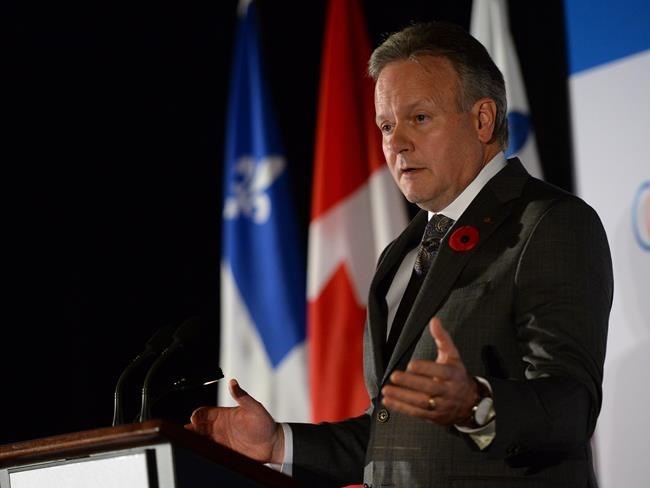
Bank of Canada governor Stephen Poloz speaks at a conference co-hosted by CFA Montreal and the Montreal Council on Foreign Relations in Montreal on Tuesday Nov. 7, 2017. Inflation has repeatedly fallen short of the Bank of Canada's two per cent target in recent years, but governor Poloz said Tuesday fundamental factors are continuing to drive price growth. THE CANADIAN PRESS/Ryan Remiorz
Republished November 07, 2017 - 2:17 PM
Original Publication Date November 07, 2017 - 10:06 AM
MONTREAL - Canada's central bank is not worried that people will expect very low inflation to continue because it has repeatedly fallen short of the Bank of Canada's two per cent target, governor Stephen Poloz said Tuesday.
"As a central banker you always concern yourself with...the risk that expectations will gravitate towards the actual experience instead of to the target itself," he told reporters after discussing inflation with a Montreal business audience.
But he said there is no evidence of a "de-anchoring" of expectations, saying all of the bank's surveys suggest a strong knowledge about the two per cent target established 25 years ago following a period of high and volatile inflation and interest rates.
While the bank has an inflation target range of between one and three per cent, Poloz isn't overly concerned if it dips below or rises above the midway point. He said many advanced economies have faced a similar trend.
In a luncheon speech to CFA Montreal and the Montreal Council on Foreign Relations, Poloz said the fundamental drivers of supply and demand, as well as short-term factors, can explain the movement in prices and that the popular perception that inflation has become inexplicable is exaggerated.
"In part this perception reflects a misunderstanding of the accuracy with which economists can predict inflation and a misunderstanding of the precision with which central banks can control it," he told an audience of 1,000.
Inflation in Canada slowed over the first half of this year and remained in the lower half of the Bank of Canada's target range even as the economy grew quickly.
However Poloz said that there have been a number of one-time factors including below-average food inflation and the Ontario government's reduction in electricity prices that helped keep inflation in check.
"The bottom line is that fundamental drivers of inflation, along with some special factors we can identify, can explain the recent behaviour of inflation reasonably well," Poloz said. "Certainly the remaining shortfall is well within a reasonable margin of error."
Poloz also said there may also be some drag on inflation from globalization and digitalization, which the bank is studying.
"Over time, as we accumulate data, we may be more able to identify and statistically quantify these effects," he said.
The Bank of Canada aims to keep inflation at two per cent by making changes to its key interest rate target. Poloz said it takes 18 to 24 months for a change in interest rate policy to have its full impact on inflation.
In keeping the rate on hold last month, the Bank of Canada said less monetary policy stimulus will likely be required over time, but that it will be cautious in making future adjustments to the policy rate and be guided by the incoming economic data.
"A lot of pieces need to fall into place before we can be certain that the economy has made it all the way home," Poloz said Tuesday.
While higher wages can add to inflationary pressure, Canada's improving jobs picture hasn't been accompanied by much increase in real wages. Youth participation rates are still low and many other people have found part-time work.
"The trendline for wages has been quite low and the fact that we've got a perk up in the last datapoint is encouraging and you never know when it's the beginning of an uptrend but we need more datapoints to be assured of that," he said after the speech.
Poloz also said the U.S. threat of killing NAFTA has created uncertainty that can affect company investment decisions.
"We know from our survey that even though investment intentions are higher, they're not as high as they would be without the uncertainty due to NAFTA."
— With files from Craig Wong in Ottawa.
News from © The Canadian Press, 2017